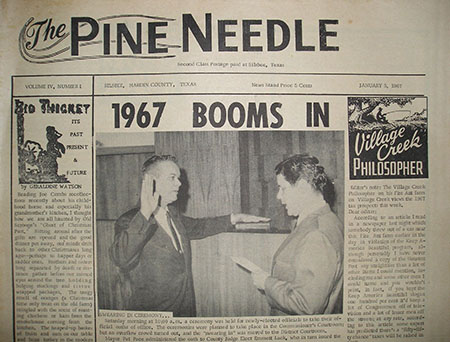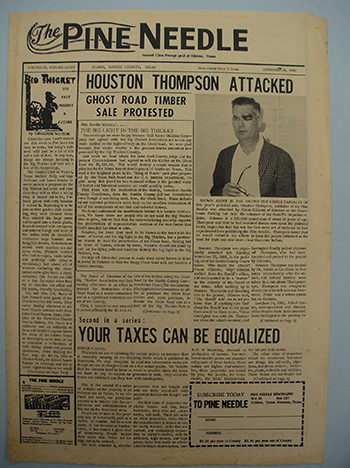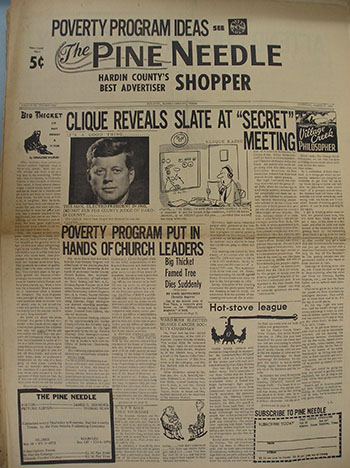Controversial Hardin County paper to be digitized
 Lamar University Archivist Penny Clark, who previously used a grant to have 16,864 pages of University Press holdings digitally archived, has now been awarded a 2015 Rescuing Texas History grant from the University of North Texas to start a new digital archival project.
Lamar University Archivist Penny Clark, who previously used a grant to have 16,864 pages of University Press holdings digitally archived, has now been awarded a 2015 Rescuing Texas History grant from the University of North Texas to start a new digital archival project.
Using the grant in partnership with the Sam Houston Regional Library and Research Center, Clark will digitize every issue of The Pine Needle, a weekly newspaper that ran from 1964-1968 in Hardin County. The paper, which had a fairly stable readership, sought to point out political corruption and argue for preservation of the Big Thicket long before its national preserve status.
“Newspapers unfortunately won’t hold up to time,” Clark said. “So we have two overriding goals here, preservation and access. We also want to become better known for our Big Thicket collections. This is why we’re digitizing The Pine Needle.”
The Pine Needle was co-owned and published by Houston Irving Thompson, a local man who grew up during the Great Depression in Hardin County. Thompson graduated from Columbia Law School and practiced law in Houston for many years before returning to Hardin County to represent the needs of Southeast Texans. He believed area residents to be victims of a single-product economy, unfavorable working conditions and political corruption.
In midcentury Hardin County, that single product was lumber, and most of the local workforce was employed in its growth, harvesting, processing and shipping. Many complained of low wages and unsafe working conditions.
 “The county judge, in office for 24 years, was on [a lumber company’s] payroll as legal advisor, and the members of the commissioner’s court were all establishment men. If you had a boundary dispute with a lumber company in court, there was no doubt of the outcome.” the late Geraldine Watson, conservationist and former writer for The Pine Needle, says in her book “Reflections on the Neches: A Naturalist’s Odyssey Along the Big Thicket’s Snow River.”
“The county judge, in office for 24 years, was on [a lumber company’s] payroll as legal advisor, and the members of the commissioner’s court were all establishment men. If you had a boundary dispute with a lumber company in court, there was no doubt of the outcome.” the late Geraldine Watson, conservationist and former writer for The Pine Needle, says in her book “Reflections on the Neches: A Naturalist’s Odyssey Along the Big Thicket’s Snow River.”
According to Clark, Thompson thought Hardin County was under the thumb of these big lumber businesses, and was moved to champion for a change through The Pine Needle. He felt that if they could expand the local economy and remove even a small amount of dependency on lumber, life in Hardin County would improve.
This led Thompson to advocate for the creation of a tourism industry, which he believed would attract outsiders to the Big Thicket and boost its neighboring economies.
The paper began to focus on the area’s unique and diverse ecology, seen as the means to promote such tourism and to distinguish the Big Thicket as a treasure to ensure its eventual preservation.
The paper documents findings and photographs from renowned area ecologist and part-time staff writer Geraldine Watson, who devoted her life to the Big Thicket’s preservation even after it was named a national preserve in 1974.
 “It was controversial to work in ecology at that time,” Clark said. “Opponents of the Big Thicket’s preservationists were even said to have poisoned a thousand-year-old tree destroying a magnificent wonder of nature and undermining the unique value of the Big Thicket.”
“It was controversial to work in ecology at that time,” Clark said. “Opponents of the Big Thicket’s preservationists were even said to have poisoned a thousand-year-old tree destroying a magnificent wonder of nature and undermining the unique value of the Big Thicket.”
The Pine Needle also contains content relevant to family history and county records, among other things.
“The paper is a source for rich folklore and history that’ll be recorded for not just those involved in the Big Thicket, but genealogists and anthropologists, too,” Clark said. “There are also interviews with older people who talked about their experiences and shared unique stories.”
One such story concerned a man who supposedly hadn’t worn shoes since World War I, except for his wedding day and a few other choice occasions.
Thompson also used his paper as a platform to write about injustices outside of the lumber industry. His unapologetic views even led to the suspected arson of his office, according to Clark.
“[He] made the case for brutality within the police force and within the jails. And I think that’s also very current,” Clark said. “He didn’t hesitate to name names in local politics, either. He made a lot of enemies.”
Like the University Press issues online, digitally uploaded issues of The Pine Needle will be fully searchable by keyword.
“We’ll pack our holdings up as soon as possible and send them via inter-library loan courier to the University of North Texas. Once ours are done, I’ll drive up to Liberty to pick up the Sam Houston Regional Library’s copies, too,” Clark said. “When it’s digitized, people will use it in ways we’ll probably never even know. And that’s the beauty of it. It’s going to be accessible online for anyone.”
The paper’s digital files will be uploaded onto the Mary and John Gray Library site (www.lamar.edu/library) and will also be available at the University of North Texas’s Portal to Texas History site (texashistory.unt.edu). For more information, contact Archives and Special Collections or Penny Clark at (409) 880-7787.


